- Home
- David Lubar
The Battle of the Red Hot Pepper Weenies Page 2
The Battle of the Red Hot Pepper Weenies Read online
Page 2
As we danced, I couldn’t help thinking how lucky I was. Some of the other girls at the dance might have nice guys, or guys who they thought were perfect for them. But out of all the girls in the gym, I was the only one who could honestly say that my guy was made for me.
THE RATTY OLD BUMBERSHOOT
The first rumble of thunder struck just as Woodrow was stealing the comic book. He froze, looked around, then slipped the comic from the middle of the pile. “That jerk will never miss it,” Woodrow muttered. It served Dwayne right for bringing the comics to show-and-tell and bragging about how many he had. Woodrow’s mother didn’t approve of comics, so he didn’t have any of his own. But these were too awesome to resist.
Woodrow stuck the comic in his desk and joined the rest of his class outside for recess. When they got back, he watched Dwayne carefully. Sure enough, the fool never checked through the stack.
Perfect, Woodrow thought. At the end of the day, he waited until everyone else had left, then slipped the comic under his shirt and headed out.
The rumbles grew closer. A raindrop hit Woodrow’s nose. He looked up at the sky just as the clouds let loose. A heavy rain fell, and wind slapped at his face. He hunched over and ran for the nearest shelter—a porch on an old house to his left.
The rain seemed to grow even harder. Woodrow shivered and watched the water rushing into the gutter across the street. He jumped as the door behind him opened. He spun and found himself facing a plump old lady with frizzy white hair and red cheeks. She looked like someone who baked lots of cookies.
“Do you want to come in?” she asked.
“No.” Nearly every day, in school and at home, Woodrow was warned about strangers. Besides, his favorite show was starting in ten minutes. “I have to go.”
“Well,” the woman said, “you aren’t dressed for this kind of weather. You’ll get soaked to the bone.”
Woodrow glanced at the lawn, where the grass was already turning into a land of miniature lakes. The woman was right. The rain would soak right through his shirt. He didn’t care if he got wet, but the comic would be ruined. He’d dropped a magazine in his bathtub once. The pages had gotten all warped and rippled, and they’d stayed that way even after they dried out.
“But I really need to get home,” he said.
The woman looked over her shoulder, and then back at Woodrow. “You wait right here, young man.”
She scurried off. There was a clatter and a bit of banging; then she returned with a smile and an umbrella. “You can borrow my ratty old bumbershoot,” she said. “I’m not planning to go out in this downpour.”
“Bumbershoot?” Woodrow asked.
The woman laughed. “Silly me. I guess it’s an old-fashioned word. But I’m an old-fashioned lady.” She thrust out the umbrella. “Here. Take good care of it.”
“I will.” Woodrow pushed the umbrella open and held it over his head with one hand. The fabric smelled like old people. The handle was white, like ivory. The shaft was some sort of polished dark-brown material. He pressed his other hand against his chest, keeping the comic in place. The umbrella was large enough to cover him like a canopy. The tips of the ribs dropped past his shoulders.
Leaning against the wind, Woodrow stepped off the porch. The splat of water against the umbrella nearly drowned out the woman’s next words. “You be sure to come back,” she said.
“I will. I promise.” Woodrow didn’t want to keep her stupid umbrella. Which didn’t mean he’d go to the trouble of bringing it back. He planned to chuck it in the trash once he got out of the rain.
The wind whipped up, jerking the umbrella in his hands. One of the end tips scratched his cheek. Woodrow swore and grabbed the handle with both hands, keeping his arm pressed against the comic so it wouldn’t fall out from under his shirt.
The wind gusted again. The umbrella twisted and flapped like it was trying to fly back home. “You can borrow my bumbershoot,” Woodrow said, mocking the woman’s voice. “Yeah, sure, I’ll bring it back. Stupid old lady…”
Another gust nearly tore the umbrella from his hands. He pulled it closer, tilting it so he could see well enough to know where he was going.
For a moment, the umbrella was strangely still. Then it flapped and jerked again. As the snap of the fabric filled his ears, Woodrow realized something was missing.
No rain.
The sound of the raindrops had stopped. The puddles around him were unrippled. The umbrella jerked and flapped.
Woodrow didn’t hear leaves rustling. He didn’t feel his pants legs flapping. No wind. The storm was over.
In the instant that it took Woodrow to wonder how an umbrella could flap when the air was dead calm, he lost his chance to fling it away. By the time he tried, it was too late. The umbrella clamped down on him with a wet snap. As the stiff fabric encased him, Woodrow struggled to free his arms. A dozen sharp jabs ringed his body as something bit into his flesh.
Woodrow let out a muffled scream. He kicked. He fell to the ground and rolled. It didn’t matter. Nothing could make the bumbershoot let go of him. Not until it was finished.
When the wind picked up again, blowing back toward the house, the ratty old bumbershoot let go of what little remained, and tumbled back home, leaving behind nothing but a damp pile of clothes, a soaked pair of muddy shoes, and a wet, ruined comic book. As it bumped back against the porch steps, a small moist sound came from among the flaps. It might have been a burp.
DEAR AUTHOR
Class, we are going to write letters,” Ms. Twilliger said.
Everyone groaned. Nobody writes letters anymore, except kids whose parents make them write letters to thank their aunts and uncles for stupid sweaters that don’t fit and look so ugly even a dog wouldn’t want to wear them.
But my attitude changed when she added, “You’ll each write a letter to your favorite author.”
Now that was sort of cool. I loved Digby Morgenstern. He wrote the best books. My favorite was Snot Rocket, about a kid who could go places by sneezing real hard.
I was afraid Ms. Twilliger wouldn’t let me pick Digby Morgenstern, because she doesn’t seem to think much about books that involve anything wet or drippy. But she said that was fine. Actually, what she said was, “If you absolutely can’t think of anyone else.”
We also had to follow these stupid rules. In the first paragraph, we had to introduce ourselves. I guess that made sense. In the second, we had to tell the author three things we liked about his book. In the third, we had to list three things we didn’t like. I felt that this was a really stupid thing to ask us to do. Who wants to hear complaints? Dear Author, your book stinks because nothing at all happens in the first chapter except that the main character gets dressed. And then, in chapter two, he looks in a mirror and describes himself. Yeah, that would go over big.
But I wrote my letter. Here it is:
Dear Mr. Morgenstern,
I’m your biggest fan. My name is Tommy Zwinger, and I love your books. I even got in trouble once for reading one, because it made me laugh so hard that I farted during SSR. That’s Sustained Silent Reading. We do that every day. A silent room is pretty much the worst place to fart. And this one was a real monster. I almost shot out of my chair. I guess you could call me Fart Rocket.
Here are three things I love about your books. First, they make me laugh. Second, they are funny. Third, lots of humorous things happen in them.
I hate to tell you, but there are also three things I don’t like about your books. First, they are too short. (They are so good, I always want more.) Second, there aren’t enough pages in them. Third, they could be longer.
Thank you for reading my letter. Please write back to me so I can get extra credit. I know you are busy, but I could really use all the help I can get with my grades.
Your biggest fan,
Tommy Zwinger
So that was my letter. Now let me tell you three things I don’t like. First, Digby Morgenstern never wrote back to me. Second, Ms. T
williger gave me a C-on the assignment. And third, a year and a half later, Digby Morgenstern came out with a book called Fart Rocket. It’s about a kid named Tommy who gets in trouble for farting while reading a funny book during SSR.
I told everyone he’d stolen my idea. But I didn’t have a copy of my letter, so nobody believed me. That didn’t matter. I wasn’t going to let him get away with it. So I wrote him another letter. This time, I didn’t bother listing three things I liked about his books. I just came right to the point.
Dear Mr. Morgenstern,
You stole my idea. Remember me? The original Fart Rocket? I hate you. I told everyone it was my idea, and they all made fun of me. They called me Liar Boy. All day long, they hold up stuff—books, staplers, even rocks—and say, “Hey, is this your idea, too? Did you invent air? Did you invent water?”
I’m getting really sick of it. You could at least have given me credit in the book. It’s too late for that now. But you could write back to me and admit it. If you don’t, I’ll be miserable for the rest of my life.
Your former fan,
Tommy Zwinger
He didn’t write back to me. I survived. Kids still mock me, but not constantly. Especially not since Walter Sphinxter took up yodeling as a hobby and Charlene Ebbermeyer decided it would be fashionable to dress like a pilgrim. But then, a year and a half after I wrote the second letter, Digby Morgenstern came out with a book called Liar Boy. You can guess what it’s about. Yup—a kid who writes to an author and gets his idea stolen, but nobody believes him. He didn’t give me credit this time, either. But I’m keeping my mouth shut. And I’m sure not writing him another letter.
THE WIZARD’S MANDOLIN
Cicarelli was the greatest wizard in Florence. Citizens came to him from all over Europe for spells, potions, and advice. They believed his magic arose from the herbs he gathered or the words he muttered from behind his long beard. In truth, they didn’t care all that much about the source, as long as the magic worked. And, in truth, they were wrong about the source.
Cicarelli cast his spells with his mandolin. All it took was the right combination of notes. An A-flat combined with a C-sharp might cause the potion he was brewing to bring its user wealth. A D-minor chord could turn the same potion into a cure for poison. A tremolo on an open E string might help transform a curse into a blessing. Cicarelli knew only one spell he could cast—or uncast—without his mandolin. But that was enough.
Daminieri was an unexceptional wizard, mediocre at best, who wanted Cicarelli’s power. For years he lurked in shadows and listened to rumors. At last, through bribes, treachery, and skulking talents a rat would envy, he uncovered the secret of the mandolin and vowed that he would steal it and become the most powerful wizard in Italy.
A half hour before sunrise, when wizards are at their weakest but the unexceptional are not all that much changed, Daminieri crept into Cicarelli’s home and lifted the mandolin from its peg on the wall. It isn’t guarded, he thought, amazed at his good fortune. He crept back out to the street and then scurried to his shack at the edge of the city.
There he sat, with the mandolin in his hands. “I will discover all of your secrets,” he whispered.
He placed one hand on the neck and the other by the sound hole. He pressed the strings against the fret board, forming a G-major chord, and strummed.
The music was not pleasant.
“It is flat,” he muttered. “I would think Cicarelli would keep his instrument in tune.”
“No,” said a voice from outside his window. “It is sharp.”
Daminieri clutched the mandolin tighter as he recognized the speaker. He turned toward the window and found himself face-to-face with Cicarelli.
“Very sharp,” Cicarelli said. There was a note of sadness in his voice.
Daminieri looked down at his hands. His face grew pale as he saw what the sharp strings had done to his fingers. His face grew even more pale as blood poured from his wounds.
Cicarelli stepped in through the door and took the mandolin from Daminieri’s hands—or what was left of them. “You’ll live,” he said. “Unless you try to steal from me again.”
He uncast the sharpness from the strings and wiped the blood from the neck with a cloth. Then he carried his mandolin home where it belonged.
INTO THE WILD BLUE YONDER
I thought I was out of luck when they canceled the local carnival this year. I love stuffing my face with carnival food like deep-fried candy bars and corn dogs, and then going on extreme rides that fling you upside down so fast that parts of you don’t catch up until an hour later. There’s nothing like a high-speed tumble with a gut full of grease to test whether you really have a strong stomach. So far, I’ve passed every challenge. Nothing makes me sick.
But last year, some forty-year-old guy who watched too many action movies tried to jump from one horse to another on the merry-go-round and broke his leg. He sued the town. He didn’t win, but the town spent a ton of money on lawyers, and refused to allow another carnival.
I thought all was lost until Buzzy Skantz came stomping up my porch this morning. “Ryan! Hey, are you there?” he shouted. He banged on the door, yelling, “Bang! Bang! Bang!”—just in case I didn’t realize someone was seeking my attention.
“What’s up?” I asked when I got to the door.
“There’s a carnival over in Lakewood,” he said. “My mom’s going to drop me off. Want to come? Don’t be a bum, chum.”
I would have instantly shouted, Yes! but Buzzy is kind of hard to hang out with. He reminds me of those comedians who shout everything instead of talking. Unlike the comedians, though, he isn’t funny. Just loud.
On the other hand, a good carnival is so loud, I might not even be able to hear Buzzy. “Sure. I’ll go.”
“Baboom!” he shouted, thrusting his arm in the air like he’d just won an Olympic gold medal. “We’re on. We’ll pick you up at seven. Not eleven. It’ll be heaven.” He ran off the porch, making race car noises.
What have I done?
I told myself it would be fine. The memory of funnel cake, cotton candy, and supersweet lemonade eased my worries.
Buzzy swung by at seven that evening. I was waiting on the porch. I could have been waiting inside a locked safe buried in a pit in my backyard and I wouldn’t have missed him.
“Ryan! We’re here! Get it in gear! Or I’ll kick your rear!”
Did I mention Buzzy thought he was a hip-hop star? I got in the car and thanked Mrs. Skantz for the ride.
She nodded and turned up the radio, real loud. Lakewood was a thirty-minute—or a one-hundred-twenty-shout—trip. But at the end of it, sure enough, there was a carnival, full of food, rides, and games.
“Have a good time,” Mrs. Skantz said as she pulled up near the entrance. “I’ll be back for you at ten. Remember to stay away from the food. You know it makes you hyper.” She handed Buzzy five dollars.
That’s not going to go far, I thought. Everything at a carnival is expensive.
“Sausage!” Buzzy screeched as he leaped from the car. He went running toward the first booth—Sonny’s Super Sloppy Sausage Sandwiches. They must be good sandwiches—there was a mob of customers. Buzzy ducked under some elbows, dodged around a couple people, and disappeared from sight. He popped back into view seconds later with a sandwich in his hands. By the time I reached him, he’d already devoured half of it.
“Bite?” he asked, thrusting the chewed end toward my face. “Tastes just right. Pure delight.”
“No thanks.” I stood back for the twelve seconds it took him to gobble down the remaining half. I liked sausage, but I wanted something sweeter. As we walked away from the booth, I saw the sausage seller glaring at Buzzy.
“Rides!” Buzzy shouted. He sprinted toward the midway. I stopped at a booth and bought some ride tickets, then followed him to the Scrambler.
“You go ahead,” he said.
That was weird. I gave the ninety-year-old guy who ran the Scrambler my ticke
t and climbed into one of the open cars. While the guy was checking that everyone was strapped in, Buzzy snuck past the gate and slipped onto the seat next to me.
So that’s how he planned to stretch his five dollars. What a slimeball. I wondered whether he’d stolen the sausage, too.
It turned out the Scrambler was a big mistake. Spinning in the air with a shouter who still has bits of a Super Sloppy Sausage Sandwich in his mouth isn’t a great thing to do if you’re wearing a white T-shirt.
“Another ride?” Buzzy asked when we staggered off the Scrambler. “Let’s stay outside. Don’t try to hide.”
“In a while. I want to get some food.” And I didn’t want to get in trouble if he tried to sneak onto another ride. I followed my nose to the funnel cake stand and bought myself a sugar-covered mass of deep-fried happiness.
Just as I was picking up my plate from the counter, Buzzy grabbed my shoulder and shouted, “Open wide! I found the coolest ride!”
The jolt sent my funnel cake sliding off the paper plate into the dirt. As I was wondering whether I could pick it up and brush it off, two little kids ran right over it.
“Let’s go!” Buzzy shouted, tugging at me. “You’re slow. Can’t say no.” He dragged me over to a really run-down-looking ride at the far end of the midway.
The sign in front, made of large individual flaking red letters that dangled from a crossbar above the entrance, read, WILD BLUE YONDER. The Y was hanging at an angle like it was ready to drop off. The rusted ride might have been blue a long time ago, but it sure didn’t look very wild. It was basically a small jet with two seats on a shaft that could swing in different directions. The jet itself looked like it could rotate on the end of the shaft. Not bad—but I really didn’t want to be next to Buzzy when I was being shaken all over the place.
Scratchy music played from somewhere at the base of the ride. I recognized the song. It was the air force theme about flying off into the wild blue yonder. Okay—so the name sort of made sense.

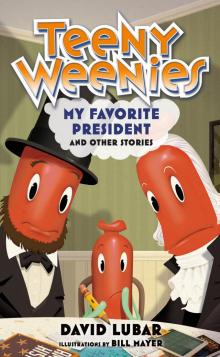 Teeny Weenies: My Favorite President
Teeny Weenies: My Favorite President Teeny Weenies: The Intergalactic Petting Zoo
Teeny Weenies: The Intergalactic Petting Zoo Teeny Weenies: The Eighth Octopus
Teeny Weenies: The Eighth Octopus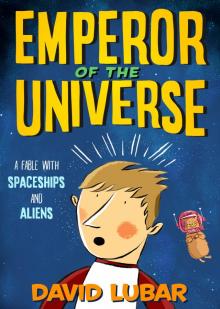 Emperor of the Universe
Emperor of the Universe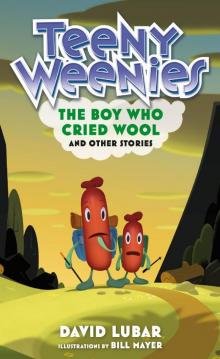 Teeny Weenies: The Boy Who Cried Wool
Teeny Weenies: The Boy Who Cried Wool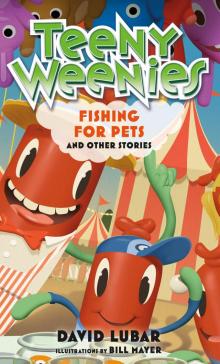 Teeny Weenies: Fishing for Pets
Teeny Weenies: Fishing for Pets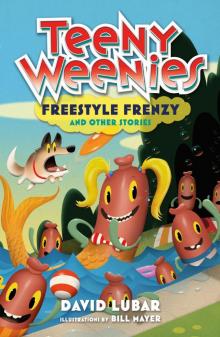 Teeny Weenies: Freestyle Frenzy
Teeny Weenies: Freestyle Frenzy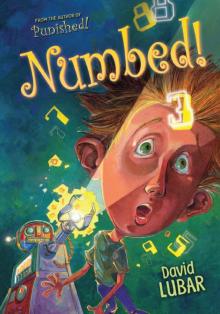 Numbed!
Numbed!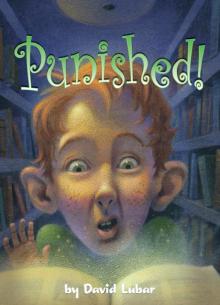 Punished!
Punished!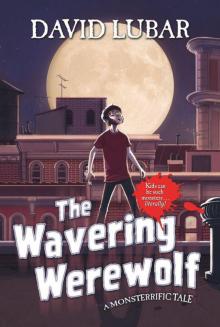 The Wavering Werewolf: A Monsterrific Tale (Monsterrific Tales)
The Wavering Werewolf: A Monsterrific Tale (Monsterrific Tales)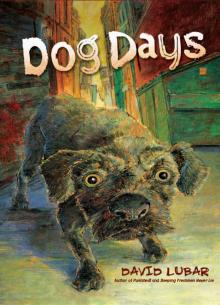 Dog Days
Dog Days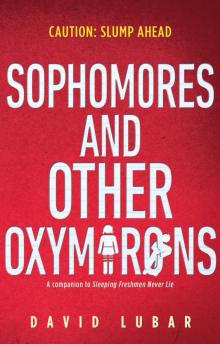 Sophomores and Other Oxymorons
Sophomores and Other Oxymorons The Psychozone
The Psychozone My Rotten Life
My Rotten Life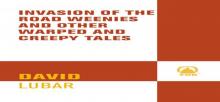 Invasion of the Road Weenies
Invasion of the Road Weenies In the Land of the Lawn Weenies
In the Land of the Lawn Weenies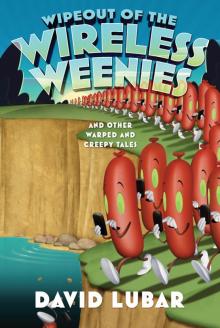 Wipeout of the Wireless Weenies
Wipeout of the Wireless Weenies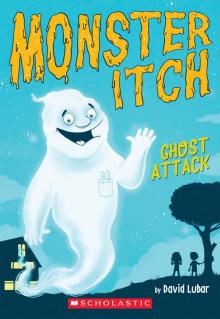 Ghost Attack
Ghost Attack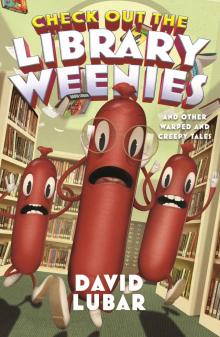 Check Out the Library Weenies
Check Out the Library Weenies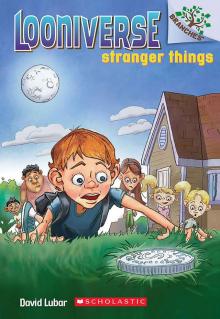 Looniverse #1: Stranger Things (A Branches Book)
Looniverse #1: Stranger Things (A Branches Book)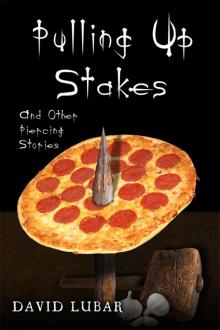 Pulling up Stakes and Other Piercing Stories
Pulling up Stakes and Other Piercing Stories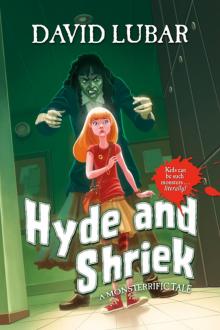 Hyde and Shriek
Hyde and Shriek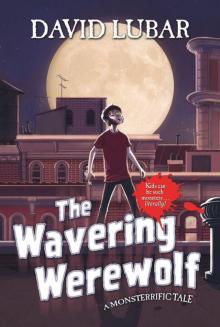 The Wavering Werewolf
The Wavering Werewolf Dead Guy Spy
Dead Guy Spy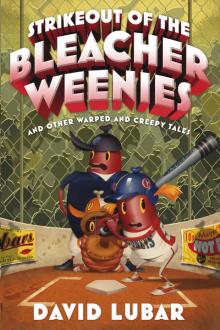 Strikeout of the Bleacher Weenies
Strikeout of the Bleacher Weenies The Big Stink
The Big Stink The Battle of the Red Hot Pepper Weenies
The Battle of the Red Hot Pepper Weenies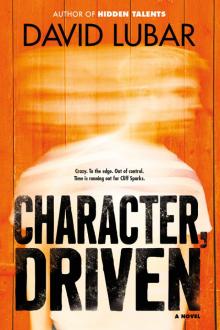 Character, Driven
Character, Driven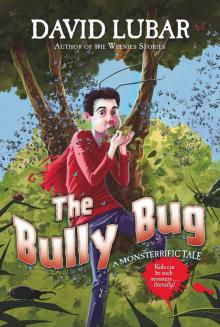 The Bully Bug
The Bully Bug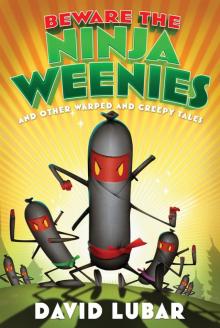 Beware the Ninja Weenies
Beware the Ninja Weenies Extremities: Stories of Death, Murder, and Revenge
Extremities: Stories of Death, Murder, and Revenge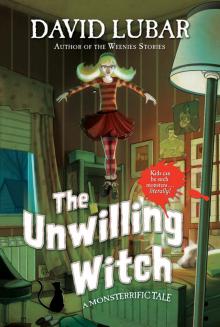 The Unwilling Witch
The Unwilling Witch Goop Soup
Goop Soup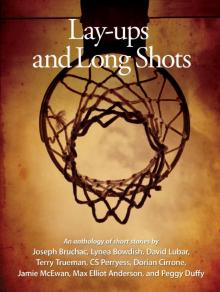 Lay-ups and Long Shots
Lay-ups and Long Shots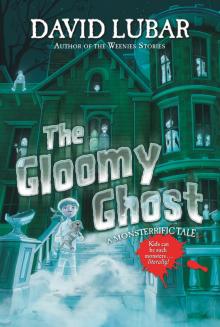 The Gloomy Ghost
The Gloomy Ghost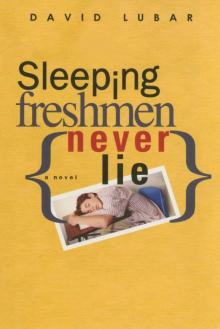 Sleeping Freshmen Never Lie
Sleeping Freshmen Never Lie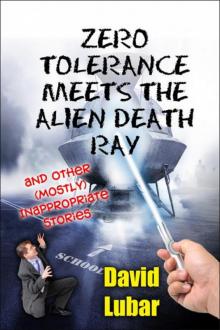 Zero Tolerance Meets the Alien Death Ray and Other (Mostly) Inappropriate Stories
Zero Tolerance Meets the Alien Death Ray and Other (Mostly) Inappropriate Stories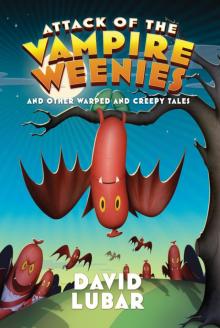 Attack of the Vampire Weenies
Attack of the Vampire Weenies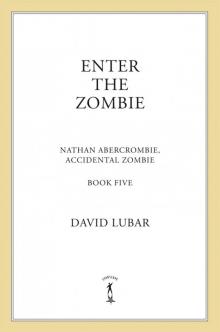 Enter the Zombie
Enter the Zombie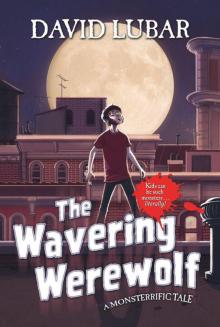 The Wavering Werewolf_A Monsterrific Tale
The Wavering Werewolf_A Monsterrific Tale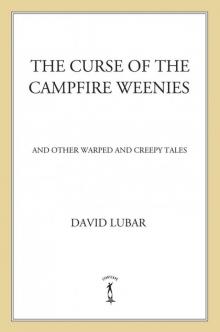 The Curse of the Campfire Weenies
The Curse of the Campfire Weenies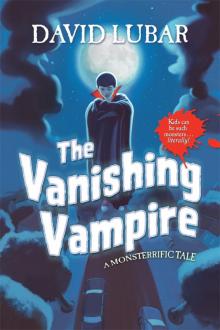 The Vanishing Vampire
The Vanishing Vampire